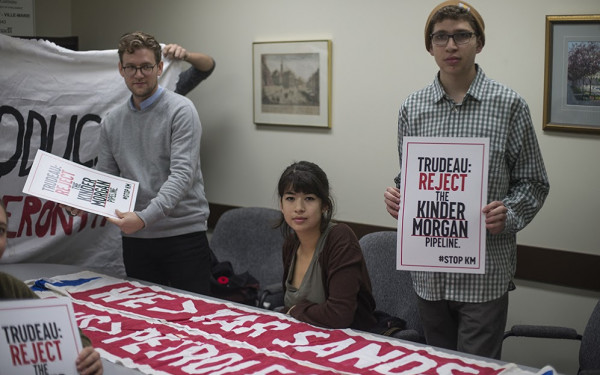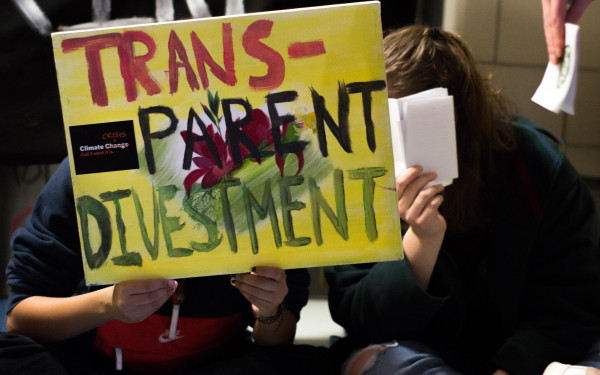Editorial: Energy East Victory, Concordia University Needs to Wake Up
Last Thursday, a huge piece of news hit stands.
The Energy East pipeline project—which would have been North America’s largest pipeline—is dead in the water, before it even began construction.
Despite the best efforts of a multi-million dollar company, and despite the constant negging of politicians across the Canadian territory and political spectrum, it was announced that TransCanada’s Energy East pipeline was cancelled.
Hopefully, this will be a spark for Concordia University to have the courage to finally face Goliath.
It’s difficult to overstate the significance of this decision. Only a few years ago, Alberta’s tar sands seemed unstoppable. The extraction of this “unconventional oil,” which requires clear-cutting huge swaths of the Boreal forest and strip-mining the soil underneath, was the main driver of Canada’s economy, we were told.
Despite terrible health effects on Indigenous communities downstream, and despite the fact that NASA climatologist James Hansen described it as “game over” for our climate, the tar sands were moving ahead, and no one could stop it.
That’s what it seemed like, anyways. But a few dedicated organizers wouldn’t accept that. They saw a weak point in the planned expansion of the tar sands. They saw that it was landlocked, and couldn’t feasibly expand forever without a way of bringing that oil to export.
So began a campaign of opposition against pipelines, ports, and the infrastructure that would allow the tar sands to expand.
A few dedicated organizers don’t make a movement, though. Defeating pipelines meant gaining popular support, and changing the narrative. It would take a broad, mass coalition across all sectors of society to mount a winning challenge against the most powerful industry in the country.
That coalition, to fit against Energy East, was built over years here in Quebec. A large part of it can be traced to the launch of Coule Pas Chez Nous in 2014. That campaign brought together groups from across the province, based in nearly every small town that Energy East was planned to pass through. It provided a common message, and training materials to organizers.
Before long, dozens of mayors had passed municipal laws condemning Energy East, and opinion polls showed that a majority of Quebecers wanted nothing to do with the pipeline. The narrative had shifted.
Lawsuits were used to prevent the construction of an export station in Cacouna, a small town on the St. Lawrence river which is also home to a breeding ground for endangered Beluga whales. TransCanada needed to find another port to ship from.
Investigative journalists at the National Observer revealed that judges on the National Energy Board—the body which approves energy infrastructure in Canada—was secretly meeting with TransCanada lobbyist Jean Charest, the former premier of Quebec who is perpetually mired in corruption scandals. Days later, activists shut down the NEB hearing on Energy East in Montreal using direct action. The NEB announced that the entire process had to be restarted, delaying construction of the pipeline significantly.
Finally, longstanding pressure from activists finally led the NEB to adopt a “climate test” as part of its decision-making process. This meant that not only would the pipeline be subject to an environmental assessment based on the impact of its construction, but would also be scrutinized based on the effects of the oil it shipped afterwards.
This was the final nail in the coffin for Energy East. Shortly after that decision was made, TransCanada announced that the project would never see the light of day.
The victory was astounding, and we at The Link applaud the years of hard work that organizers put into stopping this pipeline.
The struggle against climate change isn’t over, though. To our knowledge, our university, Concordia, still hasn’t divested its holdings in the fossil fuel industry. We’ve said it before, and we’ll say it again—the time to divest is now.
With such an enormous victory on our heels, we can’t get sloppy. We need to build off of the momentum caused by the death of Energy East to begin building a movement that challenges the fossil fuel industry wherever it presents itself, including at our university.
Just this year, Université Laval became the first university in Canada to remove all its investments from the fossil fuel industry. The campaign by ULaval sans fossiles was short. Their university administration was open to the idea of fossil fuel divestment and saw an opportunity to be a leader in this respect.
For all the appearances that Concordia gives off as being an institution that embraces the challenge of building a sustainable future, it needs to do more than” spending a fraction of its endowment fund towards sustainability causes. It needs to be bold.
As students and members of the community, we are well aware of how difficult it can be to get our university to do the right thing. It won’t be the first time and there are lessons we can take from the fresh victory of the anti-pipeline movement.
Whether activists are using tactics that are inside or outside the formal consultation or decision making bodies of the university, Divest Concordia needs to continue doing the thankless task of informing and mobilizing the members of our community, and it is our duty to support them.
As we were shown last week, it’s by building a broad coalition, looking outside traditional activist circles, that we can make a seemingly immovable institution put its money where its mouth is.






